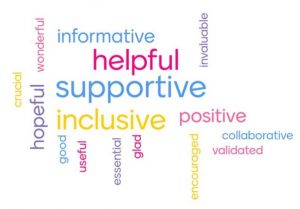
Gloria Muñoz Romero and Laura Howard: Making new connections at work – Join a staff network
On the picture from left: Laura Howard, PhD candidate Archaeology and Gloria Muñoz Romero, PhD candidate Planning and Environmental Management
According to the organization Mental Health UK, one in five workers experience a sense of loneliness at work (Mental Health UK 2022) [1]. With those from minority ethnic groups being at greater risk of experiencing feelings of isolation. In the United States, a workplace survey indicated that 39% of Hispanic workers and 30% of African American workers felt alienated from co-workers, compared to 26% of white workers (Hunter-Gadsden 2020) [2].
Many factors contribute to loneliness at work in the UK. Journalist Leslie Hunter-Gadsden says loneliness at work is often related to the feeling of being ‘uniquely alone’ (Hunter-Gadsden 2018) [3]. The impact of being an ‘Only’ is a phenomenon that occurs more frequently among black, Asian, or Latina women, and refers to the sense that one is the only minority in a workplace.
Additionally, new work arrangements after the COVID-19 pandemic (E.g. home and hybrid working) have been identified as a possible hindrance to building friendships among work colleagues.
While making new connections can be difficult, research shows that developing meaningful connections in the office matters. Having access to work-related advice via network ties can increase satisfaction at work (Pullen et al 2023). And addressing loneliness through building networks and communities can also help mitigate the sense of being an ‘Only One’.
At The University of Manchester there are over 20 staff networks you can join. Each network has a specific topic that binds the group together. They are free to join and are open to all members of staff (including PGR students).
Staff networks are designed to promote a more inclusive work environment by generating safe spaces for networking among people from across the University, fostering peer-to-peer support, and raising awareness of the unique barriers that can sometimes go unseen and unheard in the workplace.
Because each staff network is connected to the University’s EDI Committee, joining a staff network is also a great way to influence policy development at the University.
Case Study DSN (Laura Howard)
As disabled staff members, I think we’ve all felt like we were the ‘Only One’ at some point in our careers. There are many barriers we face that our non-disabled colleagues do not. However, because we perceive that we’re the only one’s experiencing these barriers, we’re reluctant to raise them. This is due to several factors, from fear of being seen as incapable, fear of being seen as difficult, and fear of hampering our career progression. As a result, most of us are used to ‘masking’ our disabilities and projecting a ‘facade of normalcy’.
Becoming co-chair of the DSN was life changing. Finally I had a safe space where I could talk ‘mask off’ about all the barriers I faced, with people who understood my experience. Just talking with others and learning I wasn’t alone, that the barriers I faced were real, helped me gain a sense of community.

Image: Mentimeter Feedback from DSN Members Winter 2023 Meeting.
The DSN has been instrumental in improving the experiences of disabled people at UoM, both on an individual basis and on a systemic basis. Our network has grown to represent over 200 disabled staff members at UoM. Because we now have a unified voice, we have been able to drive real institutional change. This includes changes to hybrid working, disability training, building access, and DASS support. Working together we have effectively communicated to senior leadership the barriers we face, as the issues that affect us aren’t being raised by one person, but an entire network.
To join a staff network or become an ally please contact the group of your interest.
References:
[1] Mental Health UK (2024) Loneliness and mental health at work. Available at: https://mentalhealth-uk.org/help-and-information/loneliness-and-mental-health-at-work/ (Accessed 18 April 2024)
[2] Hunter-Gadsden, L. (2020) Why People Of Color Feel The Loneliest At Work. Available at: https://www.forbes.com/sites/nextavenue/2020/05/19/why-people-of-color-feel-the-loneliest-at-work/ (Accessed 18 April 2024)
[3] Hunter-Gadsden (2018) The Troubling News About Black Women in the Workplace. Available at: https://www.nextavenue.org/black-women-workplace/ (Accessed 18 April 2024)
[4] Pullen, E., et al. (2023) Racial disparities in the workplace: The impact of isolation on perceived organizational support and job satisfaction. Psychiatric Rehabilitation Journal, 46, 1, 45-52.
By Gloria Muñoz Romero, PhD candidate Planning and Environmental Management, and Laura Howard, PhD candidate Archaeology






0 Comments